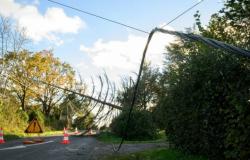
Prime Minister Michel Barnier sees his popularity rating crumble by four points in November, and his future seems precarious while 53% of French people think that censorship of the government is desirable, according to polls published this Saturday, November 23, in the evening.
While 45% of respondents said they were satisfied with Mr. Barnier when he took office in September, then 40% in October, they are now only 36% in a tormented budgetary autumn for the executive, according to the Ifop barometer for the Sunday Journal.
Among the most dissatisfied categories are workers, but also civil servants (73% each), the unemployed (79%), supporters of La France insoumise (80%) but also of the National Rally (73%, + 4 points) .
Emmanuel Macron's rating stagnates, as in October, at 22% satisfied, its lowest level since 2017.
In a difficult social context – between announcements of social plans, farmer demonstrations and budget cuts – 53% of French people say they would like to see the government fall, according to an Ipsos study for La Tribune Dimanche.
Supporters of La France insoumise (88%), the Socialist Party (73%) and the National Rally (67%) are the most likely to see a motion of censure on their subject.
But what follows divides the people surveyed into three blocks: the first (29%) would be ready to reappoint Michel Barnier at the head of a new government; the second (33%) pleads for appointing a new Prime Minister from the ranks of the political parties constituting the “common base”, which currently supports the government of Michel Barnier; and the third (38%) would like to see a Prime Minister from the New Popular Front, bringing together left-wing political parties, appointed.
The Ifop survey was carried out among a sample of 2,005 French people representative of the population aged 18 and older, reported online from November 13 to 21, using the quota method. Margin of error 1 to 2.2 points.
The Ipsos survey was carried out among a sample of 1,000 French people representative of the population aged 18 and over, collected online from November 20 to 22, using the quota method. Margin of error 0.6 to 3.1 points.
France





